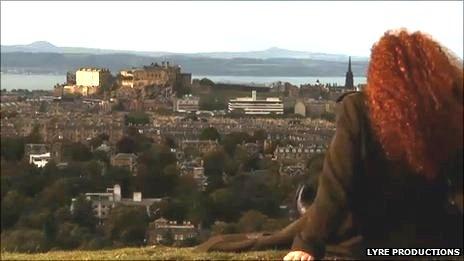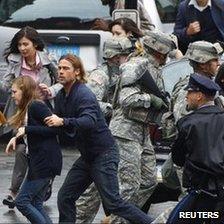How to make a movie for just £15,000
- Published

The Space Between, which was made for just £15,000, is a love story set in Edinburgh
Scotland has been enjoying a starring role in the movie world this year.
Big-budget Hollywood films World War Z and Cloud Atlas have drawn stars such as Brad Pitt and Halle Berry to Glasgow's streets.
But a clutch of Scottish film-makers are showing big bucks are not required to make industry-standard movies.
They include one writer, director and producer who has made his second feature film on a budget of just £15,000.
Tim Barrow's The Space Between is already on a screening run, having been shot in just 17 days in Edinburgh and London.
Described as an "Edinburgh love story", the film has already drawn praise from critics for the quality of its soundtrack and cinematography, among other things.
Raindance Award
The Space Between is Lyre Productions' second feature film. In 2007, its Scottish road movie The Inheritance won the Raindance Award at the British Independent Film Awards and was nominated for two Bafta Scotland New Talent Awards.
That first venture cost him only £5,000 - so how has he managed to produce quality work on such wafer-thin budgets?

Scotland has seen its fair share of film stars this year, including Brad Pitt
On his latest offering, he explained: "The budget of £15,000 covered payment for cast and crew, covered their food and accommodation.
"It being Edinburgh, we could put a lot of people up with friends or at local guest houses, which kept the costs down a bit."
Tim says his debut film helped to fund his second.
He said: "We were able to take the profits from The Inheritance DVD sales.
"There was a sort of drip-drip effect as we were going on, so it allowed us to take care of payments as we needed them.
"And there was begging and borrowing from friends and family and just seeing who was interested in helping support the film."
The Space Between is by no means the only low-budget movie to be filmed in Scotland in the past couple of years.
Scottish chiller
A chiller made for just £4,000 is to be given its premiere at the Inverness Film Festival next month.
Shot in Assynt, Buckie and Edinburgh, Graders' cast includes actress Janet de Vigne who appeared in the Oscar-winning Slumdog Millionaire.
Low-budget short films have also been making an impact in Scotland.
Graeme Roger, from Moray-based arts company Wildbird, made a short last year about two "oddball" characters as they journeyed across Scotland. It was part-funded by the Scottish Arts Council, which is now known as Creative Scotland.
He argues that the first thing you need for any kind of film - including low-budget - is to begin with a really strong idea.
He explained: "The beauty of making films in Scotland is that you've got the scenery, so you have got setting quite easily.
"If you know some characters, or have some eccentric friends, then you can rope them in so that's an ideal opportunity as well.
"Also, rather than forcing yourself to make something low budget, it's more that you shape things to your budget."
He added: "It's a big dose of luck, I suppose, getting the first amount of money on the table and then from there you can grow arms and legs."
'Challenging transition'
So how difficult is it to make the transition from short low-budget films to feature-length industry-standard offerings?
Gillian Berry, producer and director at Glasgow-based Sigma Films, says it can be challenging.
She said: "Low-budget shorts are a very good place to start - you very quickly find out if you have got what it takes.
"The danger with stepping up from making a low-budget short to a low-budget feature is that you are not being exposed to the real industry - to the professionals, or the real financiers.
"It will probably take the same length of time as it takes to make an industry level low-budget film - however, nobody will be paid, sacrifices will be made and you will be relying on an awful lot of generosity from the industry, which is not sustainable as it is."
Meanwhile, Tim Barrow and colleagues are taking The Space Between for screenings across Scotland.
'Long road'
He said: "It's been a long road with The Inheritance and we have only had two sources of revenue, which has been film screenings and DVDs.
"Now that we have a second film, we have multiplied those sources of revenue.
"So we have got two films which can screen in cinemas, plus we will have DVDs, plus we'll have a soundtrack - so suddenly that's five sources of revenue.
"The money starts to come back in and it starts to work like a studio would work. So if you can get through the first few years, it becomes easier."
He added: "You just want people to see your work really and then just set the dominoes up and they will fall as they are meant to."
You can hear more about low-budget film-making on BBC Radio Scotland's Business Scotland programme at 10:05 on Sunday and later by free download.
- Published4 October 2011
- Published16 September 2011
- Published17 August 2011
- Published15 August 2011
- Published27 June 2011
- Published30 June 2011
- Published25 January 2011